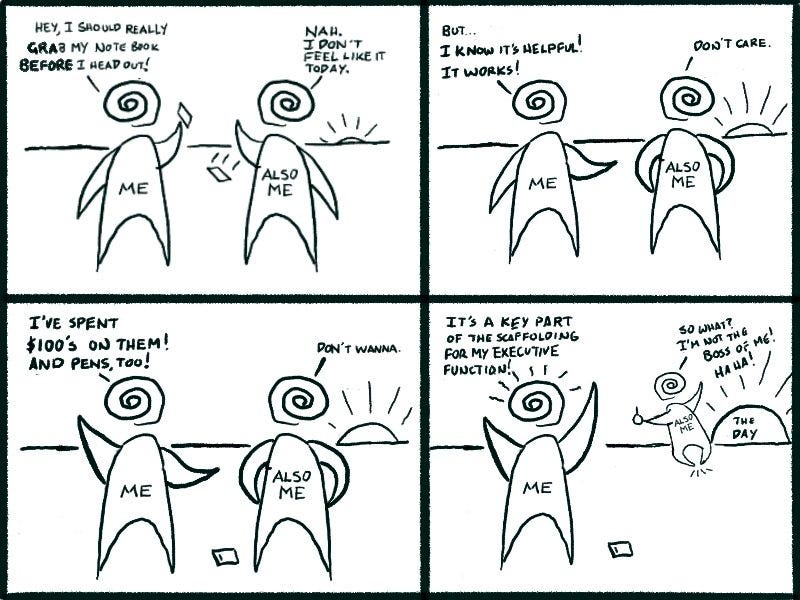Transforming Self-Sabotage into Self-Care: A Personal Journey
Written on
Chapter 1: The Essential Ingredient for Effective Habits
Recently, I composed an article discussing a crucial yet often overlooked factor necessary for developing successful habits:
Your Productivity Tools and ADHD Strategies Are Ineffective Without This Key Element.
The short version? That vital element is trust—a lesson I learned the hard way while aimlessly searching a frigid parking lot for my vehicle. However, I missed discussing a couple of fundamental prerequisites for establishing trust in your tools.
These prerequisites may seem so elementary that it feels almost embarrassing to mention them:
- You must have the tool on hand.
- You need to utilize the tool.
It sounds simple, doesn't it? Yet, I learned these lessons through my own missteps, like forgetting my notebook and losing valuable ideas, or neglecting to use the TIIMO app, which caused me to be late in picking up my grandson. Though these instances might seem trivial, they were accompanied by a sense of shame because I had promised myself to be better. I had considered bringing the notebook and utilizing the app, yet I consciously chose to ignore them.
Why does this happen? Sometimes, I find myself resenting the very habits designed to ease my life. This behavior could stem from the same dopamine-driven tendencies that lead some individuals to argue over trivial matters with their loved ones. The clinical term for this is "ODD" (Oppositional Defiant Disorder). While I appreciate the idea of being unique, I resent the overuse of the term "disorder" that the medical field tends to apply to every symptom, as well as how accurately the diagnosis reflects my own personality.
I have long struggled with managing anger, a fact my children and past partners would attest to. Although I still face challenges in this area, my battles have shifted inward—I now grapple with my own thoughts.

Internal Conversations: A Visual Representation
I often feel frustration at the notion that I rely on certain tools for day-to-day functioning. It’s not only about notebooks and apps; I harbor resentment towards sleep, feeling annoyed that I must dedicate a third of my life merely to exist. Exercise elicits similar feelings; why can’t my body just work without the necessity of yoga poses?
There's a three-letter acronym that describes this as well: IFS. A good friend introduced me to this term during a conversation about my tendencies. It stands for "Internal Family Systems," and if you weren’t familiar with it, now you are! Here’s a brief overview:
The Internal Family Systems Model (IFS) is a comprehensive approach to psychotherapy developed by Richard C. Schwartz in the 1980s. It merges systems thinking with the belief that our minds comprise various discrete subpersonalities, each possessing its own distinct perspective and characteristics. (Emphasis added)
If you're interested in learning more, there's a wealth of YouTube content available on the subject, which could serve as a great starting point:
Meanwhile, I've discovered a helpful method of reframing my perspective. Indeed, countless articles, books, and videos exist on establishing habits. When I consider the act of bringing a notebook, it’s easy to categorize it as just another habit to maintain—alongside drinking water, practicing yoga, and going to bed on time.
However, I came to realize that I could view it differently. Rather than labeling it as a habit—something I might succeed or fail to uphold—I can think of it as an act of effort. It’s a thoughtful gesture, a favor I’m extending to someone else, making their life a bit easier. And that “someone else” is, in fact, myself in the future.
By reframing this, I’m not just grabbing my notebook out of obligation; I’m doing it out of compassion for my future self who will benefit from my foresight. This shift in perspective changes everything.
Earlier today, while attending a networking event and realizing I needed to jot down some names, I instinctively reached for my notebook—and there it was. It wasn't merely a relief; it felt purposeful. I reflected on the care I had taken to pack that notebook and pen, recognizing it as an act of love and self-care from my past self.
He believes in my potential to improve my executive functioning skills. Past me took the time, even when feeling fatigued and irritable, to ensure that present me had the necessary tools at hand.
That’s not just a habit. That’s love.
The obstacle is indeed myself, but I am also the pathway forward.
Chapter 2: Insights from Ryan Holiday
In this video, Ryan Holiday discusses the essence of overcoming obstacles through self-reflection and personal growth, emphasizing that challenges can serve as powerful catalysts for change.
This second video features Ryan Holiday sharing his insights at Google, where he elaborates on the transformative power of adversity in our lives.